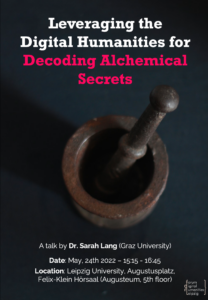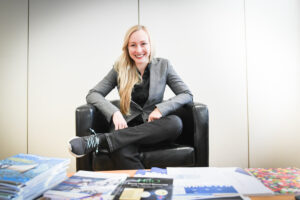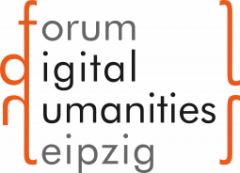Dr. Sarah Lang: „Leveraging the Digital Humanities for decoding alchemical secrets“
 Alchemical literature seems like a niche topic in History of Science but the ways in which alchemy has shaped, among others, early modern Western culture are manifold. The types of its historical remnants range from archaeological finds to museum objects but most importantly, are made up to a big degree of texts. Alchemical texts span different genres from practical recipe texts to Humanist treatises, even illustrated emblem works. They can be found both in manuscripts and in print and cover the most important European languages. Most importantly, alchemy is known for its secrecy. This talk discusses the potentials of Digital Humanities methods to help decode alchemical secrets and attempts to answer the following questions: How has the historiography of alchemy already made use of Digital Humanities methods, what potentials are still open? How can annotation and machine reasoning be used as a hermeneutic tool for the interpretation of alchemy Decknamen? And, lastly, how does one decode alchemical ciphers and how are they unusual in the historical cipher landscape of their time?
Alchemical literature seems like a niche topic in History of Science but the ways in which alchemy has shaped, among others, early modern Western culture are manifold. The types of its historical remnants range from archaeological finds to museum objects but most importantly, are made up to a big degree of texts. Alchemical texts span different genres from practical recipe texts to Humanist treatises, even illustrated emblem works. They can be found both in manuscripts and in print and cover the most important European languages. Most importantly, alchemy is known for its secrecy. This talk discusses the potentials of Digital Humanities methods to help decode alchemical secrets and attempts to answer the following questions: How has the historiography of alchemy already made use of Digital Humanities methods, what potentials are still open? How can annotation and machine reasoning be used as a hermeneutic tool for the interpretation of alchemy Decknamen? And, lastly, how does one decode alchemical ciphers and how are they unusual in the historical cipher landscape of their time?
Sarah Lang is a Digital Humanities PostDoc at the Centre for Information Modelling Graz (Zentrum für Informationsmodellierung). Training in History and Classics (Latin and Greek) in Graz and Montpellier. Digital Humanities professional since 2016. PhD Dissertation at the intersection of Digital Humanities and the early modern history of science, focusing on decoding cryptographical stylistic devices specific to alchemy (Decknamen) on the example of chymist Michael Maier’s (1568-1622) Neo-Latin corpus. Research interests include Distant Reading, Distant Viewing and using Computational Humanities methods for the history of alchemical and chymical print. Blogs at https://latex-ninja.com about the Digital Humanities and typesetting in LaTeX. Fellowships at German Historical Institute Paris, Herzog August Bibliothek Wolfenbüttel, Leibniz Institut für europäische Geschichte Mainz, Ludwig Boltzmann Institut für Neulatein Innsbruck and the Science History Institute in Philadelphia. She was awarded the Bader Prize for the History of Science by the Austrian Academy of Sciences for her work on computational methods for the history of alchemy in 2021.

